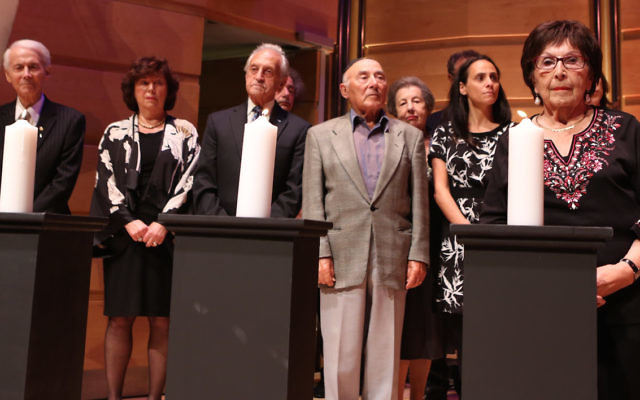Shoah remembrance in song and silence
IT began with the wailing of sirens and continued in the yearning strains of singer Ilan Kidron’s beautiful rendition of Vu Ahin Zol ikh Geyn?/Where Shall I Go?, a song written by a Polish Jew who perished in the gas chambers of Auschwitz.

IT began with the wailing of sirens and continued in the yearning strains of singer Ilan Kidron’s beautiful rendition of Vu Ahin Zol ikh Geyn?/Where Shall I Go?, a song written by a Polish Jew who perished in the gas chambers of Auschwitz.
The message of “Never Again” was potently conveyed in front of a full house at City Recital Hall on May 5 for Sydney’s Yom Hashoah commemoration in many forms, reflecting this year’s theme of creative responses to the Holocaust.
The solemn power of 1300 people standing together in total silence during the lighting of memorial candles was only matched by their heartfelt singing, as one, of Hatikvah, Israel’s national anthem.
Music and verse continued with Josh Weinberger singing The Partisan Song accompanied by pianist Paul Khodor, a youth movement choir featuring third-generation survivors sang Hebrew songs, and shudders went down spines when Rabbi Yehuda Niasoff sang memorial prayers in haunting, delicate tones.
A survivor testimony by Lottie Weiss was screened in which she recalled an SS guard in Auschwitz counting 20 Jewish women to be sent by truck to what he called “the punishment camp”, meaning certain death.
“He counted in German and said I was the 21st, so there is no room for you.” She narrowly escaped death twice more before the camp was liberated.
Ku-ring-gai MP Alister Henskens delivered the Righteous Among the Nations tribute, revealing how his uncle Leo and aunty Zus hid a Jewish mother and her two children inside their home in Holland for more than two years during World War II, ensuring their survival.
“If anyone had found out it could have been a matter of life or death for them,” Henskens said.
“While the Holocaust was the embodiment of evil, there were many who reflected the opposite.”
Keynote speaker Lily Brett – an internationally acclaimed author born in a German displaced persons camp to Holocaust survivor parents – said growing up as a second-generation survivor in Melbourne in a country with the highest number of Holocaust survivors per capita outside of Israel meant “we knew the importance of the existence of Israel as it was in our bones”.
“I think the biggest challenge in Australia is complacency,” Brett said.
“We have to speak out in the presence of injustice; I think we have to be very proud of being Jewish and we must never hate.
“Indifference allows the politics of hate to flourish.”
NSW Jewish Board of Deputies (JBOD) president Jeremy Spinak said, “Tonight we resolve to be the eyes and ears for those who no longer can tell the world what it must hear.”
SHANE DESIATNIK

comments